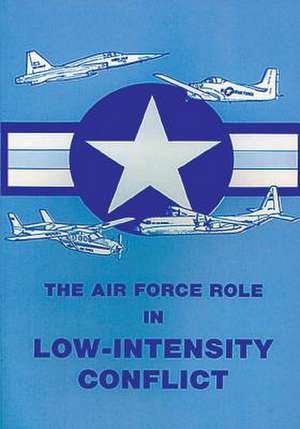The Air Force Role in Low-Intensity Conflict
Autor Lieutenant Colonel Usaf David J. Deanen Limba Engleză Paperback
Preț: 112.69 lei
Nou
Puncte Express: 169
Preț estimativ în valută:
21.56€ • 22.51$ • 17.85£
21.56€ • 22.51$ • 17.85£
Carte disponibilă
Livrare economică 14-28 martie
Preluare comenzi: 021 569.72.76
Specificații
ISBN-13: 9781478379393
ISBN-10: 1478379391
Pagini: 144
Dimensiuni: 178 x 254 x 8 mm
Greutate: 0.26 kg
Editura: CREATESPACE
ISBN-10: 1478379391
Pagini: 144
Dimensiuni: 178 x 254 x 8 mm
Greutate: 0.26 kg
Editura: CREATESPACE
